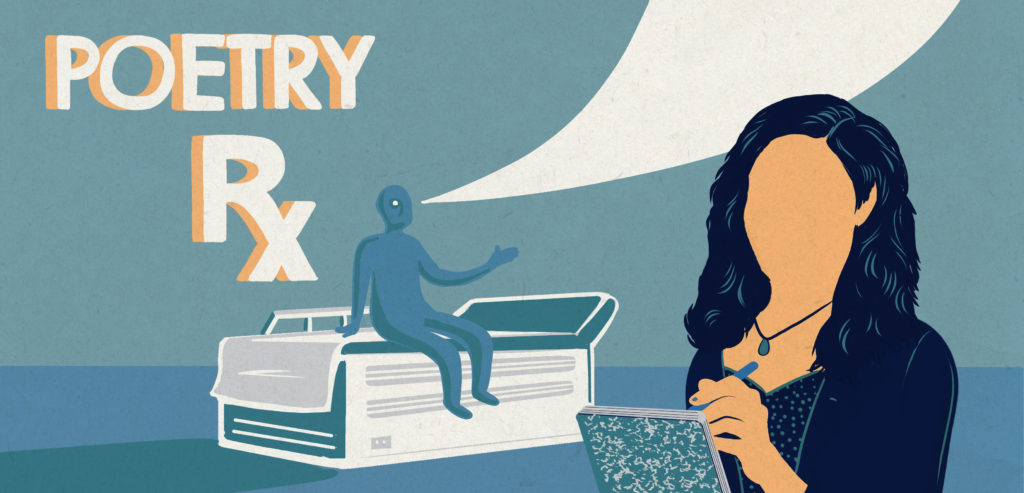In our column Poetry Rx, readers write in with a specific emotion, and our resident poets—Sarah Kay, Kaveh Akbar, and Claire Schwartz—take turns prescribing the perfect poems to match. This month, Sarah Kay is on the line.
Dear Poets,
My romantic life has been a series of almosts. Something always intervenes—poor timing, too many miles, someone else—to prevent the early intimacy from flowering into something more. I am deeply thankful for each and every one, but I’m so tired of almost. How do I stay patient as I wait for a love that finally, forcefully blooms?
Sincerely,
The Not-Quite-Ex
Dear Not-Quite-Ex,
I want to share a poem by Kathryn Starbuck called “Trout,” which is very short. It goes:
I do my best
to keep pointlessness
at bay. But here,
wet above my
knees, I let it fly.
Here, hot and cold,
fingers thick with
thinking, I try to
tie the fly and look
for the net, loosening
the philosophical
knot of why I came
here today, not yet
knowing whether
I’ll free or fry
the rainbows
and browns once
they’re mine.
I know about the disappointment of almosts. But I love the way this poem reminds us that we can’t possibly know what will feel right until it arrives. Maybe the next almost will become a definitely. Maybe it will become a definitely not. The best you can do is continue the good and difficult work of patience and trust. Have patience in the process of meeting all the rainbows and browns that are on their way, and trust in yourself that when the right one finally arrives, you will know what to do.
—S
*
Dear Poets,
A few months ago, I was a student in a writing workshop with a well-known poet. I’m a little embarrassed about how much of an effect he had on me. I’m way too old for a schoolgirl crush (although, considering how my grandma acted around her boyfriend when she was in her late eighties, maybe not) and this cuts deeper than a crush. When the class began, I was folded in on myself and atrophied. This beautiful man shattered my sense of self. I’m so grateful—that opening needed to happen in order for me to keep growing as a writer and a person. But I’m lonely, and it’s painful to consider who I could become if I had someone like him in my life. He’s not available, and years ago I promised myself that I wouldn’t invest any more time and emotion in men with whom I can’t build a life. I was able to keep that promise, until he smiled. Can you send me a poem that will give me hope that I’ll meet another man as kind and generous as him? A poem that will help me take what was good and life-changing away from this experience? A poem that won’t make me feel childish for feeling what I feel for a man I don’t really know, but understand, respect, and (dare I say) love deeply anyway?
Thanks,
Shattered, but Trying to Be Hopeful
Dear SbTtBH,
This was a very vulnerable letter to send, and I appreciate you sharing with us. I want to send you a poem by Denise Duhamel called “Sex with a Famous Poet,” which begins,
I had sex with a famous poet last night
and when I rolled over and found myself beside him I shuddered
because I was married to someone else,
because I wasn’t supposed to have been drinking,
because I was in fancy hotel room
I didn’t recognize. I would have told you
right off this was a dream, but recently
a friend told me, write about a dream,
lose a reader and I didn’t want to lose you
right away. I wanted you to hear
that I didn’t even like the poet in the dream, that he has
four kids, the youngest one my age, and I find him
rather unattractive, that I only met him once,
that is, in real life, and that was in a large group
in which I barely spoke up.
I know you asked for a poem that will give you hope for meeting another man, but I wanted to share this poem with you first, so that you know that you are not alone in harboring a fantasy about a famous poet. It’s not something to be embarrassed about. I have recommended a poem about separating the fantasy of a person from the reality of a person before, but I want to talk to you about the fantasy of poets specifically. As an art form, poetry is often deeply personal and carefully crafted, which means it can also be deceptive. It is easy to love a poem, and to feel so understood by it that it convinces you that you understand and know the poet intimately. Sometimes I am thrown off when I meet a stranger for the first time and they speak to me like they already know me well. My poetry is often deeply personal, and I think they must feel like they have had many windows into who I am. It’s flattering, and in many respects I consider their attention a gift. But the truth is that poems are very small windows, and they’re windows that we poets get to curate! I do not say this to imply that you did not have a meaningful connection with the poet you met in workshop, or to suggest that you are naive in feeling as strongly as you do. I just think it is important to remember that the window you had into this person is limited. He is an entire person outside of that workshop, who, for the most part, you don’t know! He is a human who may be kind and generous as you noted, but is probably also complex. At the moment, he appears as a symbol of what you feel you are missing, but he is not a symbol. He is a whole person with a detailed history, who has already made choices that have made him unavailable to you. That is also who he is. You wrote, “It’s painful to consider who I could be with someone like him in my life.” The good news is that you can be that person, even without him in your life. It is as though you invited him into your living room and he immediately moved some furniture around and said, Hey, did you know there’s a secret room behind the bookshelf? Inside that new secret room, you felt super-charged and excited to connect with someone. It is a room you maybe haven’t visited in a while. But even though he has left the premises, that room is still there. It is up to you to decide to spend time in there again, and who with. Hopefully you will choose someone whom you have a chance to meet on equal footing, whom you can find many windows into, who is available to you.
—S
*
Dear Poets,
If you viewed my browser history right now you’d find an image search of Óscar Alberto Martínez Ramírez with his two-year-old daughter, Valeria, who died crossing a river to seek asylum in the United States. You’d find that image on repeat. You’d also find a search for “toddler beds with storage” for my own two-year-old and, I’m sure, an endless collection of mundane, work-related queries.
It is surreal to me how ordinary things can exist on the same plane, occupying the same space and time, as the horrific. I know realistically that time doesn’t stop, that this is how it’s always been, but I can’t help but feel guilty, bewildered, numbed, askew by how life goes on in its quotidian ways even in such broken times. Perhaps there’s a poem out there that gets at this. I am at a loss. And I am so sorry.
Nightmares and Day Jobs
Dear Nightmares and Day Jobs,
You are experiencing a whiplash that occurs from vacillating so quickly between heartbreak, rage, despair, and mundanity. I think many people feel this dissonance in their lives, and feel hopeless to hold it all at once. I want to recommend a poem by Linh Dinh called “Eating Fried Chicken”:
I hate to admit this, brother, but there are times
When I’m eating fried chicken
When I think about nothing else but eating fried chicken,
When I utterly forget about my family, honor and country,
The various blood debts you owe me,
My past humiliations and my future crimes—
Everything, in short, but the crispy skin on my fried chicken.But I’m not altogether evil, there are also times
When I will refuse to lick or swallow anything
That’s not generally available to mankind.(Which is, when you think about it, absolutely nothing at all.)
And no doubt that’s why apples can cause riots,
And meat brings humiliation,
And each gasp of air
Will fill one’s lungs with gun powder and smoke.
Linh Dinh’s poem reflects on the experience of being temporarily distracted from the horrific by the mundane. The poem is not comforting, but I hope it is at least a small reassurance to know that others feel the same whiplash you describe. In terms of what to do about it, I have only an offering of what has helped me. Lin-Manuel Miranda is a longtime role model of mine, and of the many well-known words he has penned, the words of his I return to most often are these: “You cannot let all the world’s tragedies into your heart … But the ones you do let in should count. Let them manifest action.” I think about this every time I start to feel overwhelmed by tragedy. Sometimes your brain cannot hold all of it at once. Sometimes you need to find a toddler bed with storage, or to eat fried chicken, or to search for work queries, or to read a poem. But other times, when a specific tragedy or injustice like the one you describe sits especially heavy in your heart, it is an opportunity to manifest action. Not just an opportunity, but an imperative. Consider donating to Fuerza del Valle, which supports unprotected workers, fights wage theft, and builds a movement for workers’ rights in the borderlands and beyond; or La Union del Pueblo Entero, a community union that supports and organizes members of low-income communities in the Rio Grande Valley. If donating money is not possible, consider donating your time. Do what you have to do. And then do what you can.
—S
Our poets, brilliant though they may be, would like to remind you that they are only poets. If you or someone you love requires professional help, please consider the resources listed here.
Want more? Read earlier installments of Poetry Rx. Need your own poem? Write to us!
Sarah Kay is a poet and educator from New York City. She is the codirector and founder of Project VOICE and the author of four books of poetry: B, No Matter the Wreckage, The Type, and All Our Wild Wonder.
from The Paris Review https://ift.tt/2QFemIf


Comments
Post a Comment